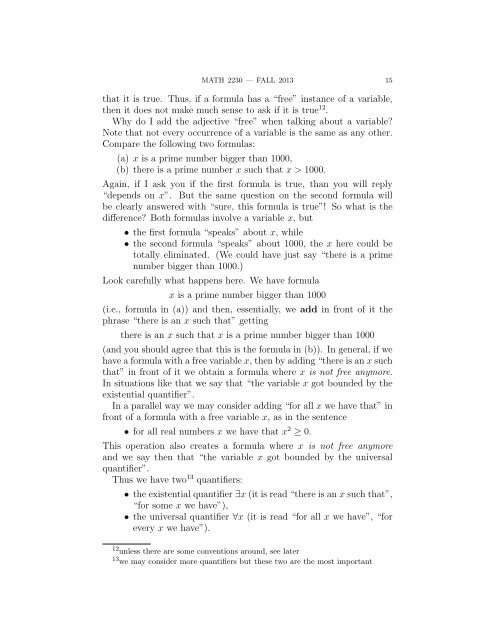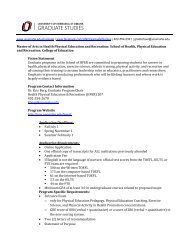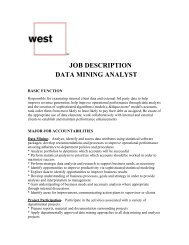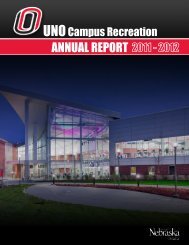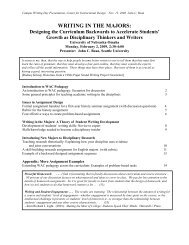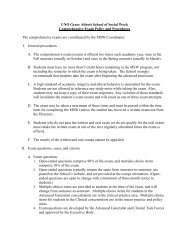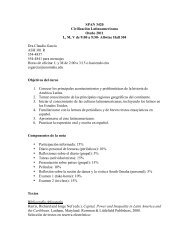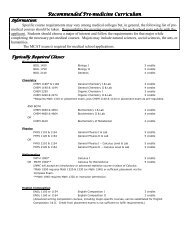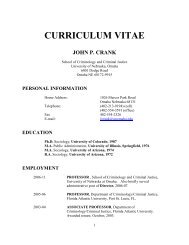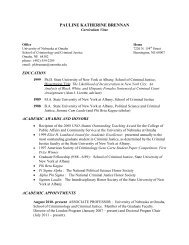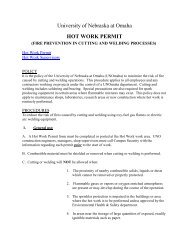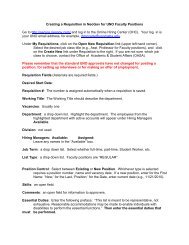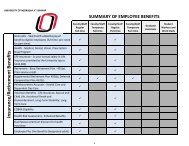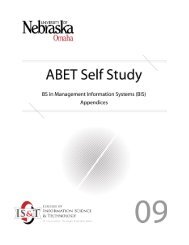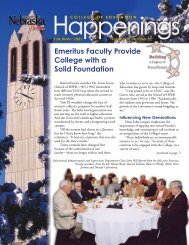Quantifiers - University of Nebraska Omaha
Quantifiers - University of Nebraska Omaha
Quantifiers - University of Nebraska Omaha
You also want an ePaper? Increase the reach of your titles
YUMPU automatically turns print PDFs into web optimized ePapers that Google loves.
MATH 2230 — FALL 2013 15<br />
that it is true. Thus, if a formula has a “free” instance <strong>of</strong> a variable,<br />
then it does not make much sense to ask if it is true 12 .<br />
Why do I add the adjective “free” when talking about a variable?<br />
Note that not every occurrence <strong>of</strong> a variable is the same as any other.<br />
Compare the following two formulas:<br />
(a) x is a prime number bigger than 1000,<br />
(b) there is a prime number x such that x>1000.<br />
Again, if I ask you if the first formula is true, than you will reply<br />
“depends on x”. But the same question on the second formula will<br />
be clearly answered with “sure, this formula is true”! So what is the<br />
di↵erence? Both formulas involve a variable x, but<br />
• the first formula “speaks” about x, while<br />
• the second formula “speaks” about 1000, the x here could be<br />
totally eliminated. (We could have just say “there is a prime<br />
number bigger than 1000.)<br />
Look carefully what happens here. We have formula<br />
x is a prime number bigger than 1000<br />
(i.e., formula in (a)) and then, essentially, we add in front <strong>of</strong> it the<br />
phrase “there is an x such that” getting<br />
there is an x such that x is a prime number bigger than 1000<br />
(and you should agree that this is the formula in (b)). In general, if we<br />
have a formula with a free variable x, then by adding “there is an x such<br />
that” in front <strong>of</strong> it we obtain a formula where x is not free anymore.<br />
In situations like that we say that “the variable x got bounded by the<br />
existential quantifier”.<br />
In a parallel way we may consider adding “for all x we have that” in<br />
front <strong>of</strong> a formula with a free variable x, asinthesentence<br />
• for all real numbers x we have that x 2 0.<br />
This operation also creates a formula where x is not free anymore<br />
and we say then that “the variable x got bounded by the universal<br />
quantifier”.<br />
Thus we have two 13 quantifiers:<br />
• the existential quantifier 9x (it is read “there is an x such that”,<br />
“for some x we have”),<br />
• the universal quantifier 8x (it is read “for all x we have”, “for<br />
every x we have”).<br />
12 unless there are some conventions around, see later<br />
13 we may consider more quantifiers but these two are the most important


